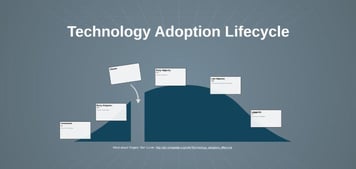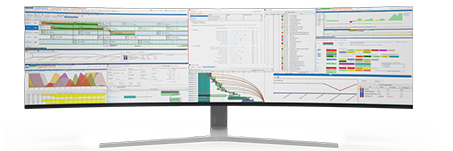Technology Adoption Life Cycle
Plant managers find themselves at the forefront of technological advancements that promise enhanced efficiency, streamlined operations, and improved overall performance in manufacturing. One such aspect that demands attention is the integration between advanced scheduling solutions like PlanetTogether and prominent ERP, SCM, and MES systems such as SAP, Oracle, Microsoft, Kinaxis, Aveva, and others.
This blog explores the intricate relationship between the technology adoption life cycle and its scheduling implications for chemical manufacturing facilities.

Technology Adoption Life Cycle
The technology adoption life cycle, as theorized by Everett Rogers, outlines the stages through which innovations progress within a society or an industry. These stages include innovators, early adopters, early majority, late majority, and laggards. Plant managers must recognize where their facility stands in this cycle to make informed decisions about technology adoption.
Innovators
Innovators in the chemical manufacturing sector are open to experimenting with cutting-edge solutions.
Early implementation of advanced scheduling tools like PlanetTogether can lead to a competitive edge.
Early Adopters
Early adopters see the potential benefits of the technology and are willing to invest in its integration.
Integration with ERP, SCM, and MES systems becomes crucial for holistic operational efficiency.
Early Majority
The majority of chemical plants enter this phase when the benefits of technology adoption become more widely recognized.
Seamless integration with established systems like SAP and Oracle becomes imperative for scalability.
Late Majority
Late majority adopts technology cautiously, often influenced by the success stories of early adopters.
Integration with Microsoft, Kinaxis, Aveva, and other systems becomes a norm for industry-standard operations.
Laggards
Laggards are resistant to change and may adopt technology only when it becomes an industry standard.
Integration challenges might arise due to the reluctance to adapt to newer scheduling solutions.


Scheduling Implications of Integration
Now, let's look into the scheduling implications of integrating advanced scheduling solutions like PlanetTogether with various ERP, SCM, and MES systems.
Enhanced Efficiency
Integration streamlines communication between scheduling, production planning, and resource management.
Real-time data synchronization ensures accurate and up-to-date information for better decision-making.
Holistic Visibility
ERP integration provides a comprehensive view of the entire supply chain, enabling better scheduling decisions.
SCM integration ensures real-time information on material availability, influencing production schedules.
Operational Flexibility
MES integration enhances shop floor visibility and control, allowing for real-time adjustments to schedules.
Adaptive scheduling becomes feasible, responding dynamically to changes in demand, supply, or unforeseen disruptions.
Data-Driven Decision-Making
Integration with systems like Kinaxis and Aveva ensures that scheduling decisions are backed by accurate and insightful data.
Predictive analytics contribute to proactive scheduling, reducing the impact of uncertainties on production timelines.
Scalability and Adaptability
Microsoft integration facilitates scalability, allowing chemical plants to adapt to changing market demands.
Seamless integration with established systems like SAP and Oracle supports long-term growth strategies.
The technology adoption life cycle profoundly influences the scheduling implications for chemical manufacturing plants. Plant managers need to strategically position their facilities within this cycle and leverage the integration capabilities of advanced scheduling solutions like PlanetTogether with ERP, SCM, and MES systems.
By doing so, they can enhance efficiency, achieve operational excellence, and navigate the evolving landscape of the chemical manufacturing industry with confidence.